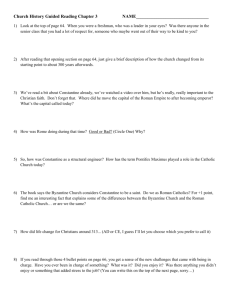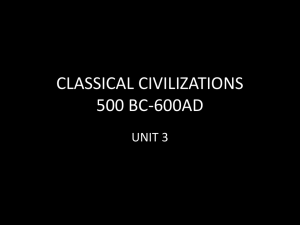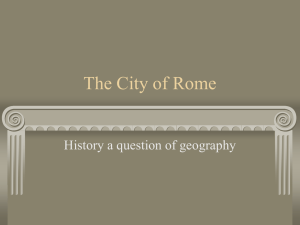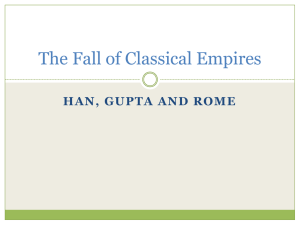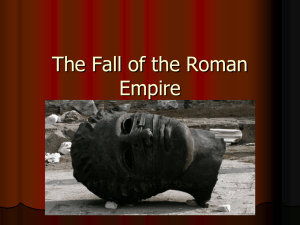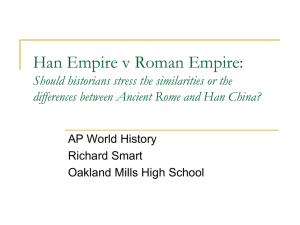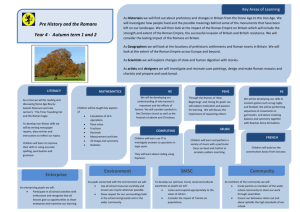Roman Trial Project The Byzantine Empire (Eastern Roman Empire
advertisement
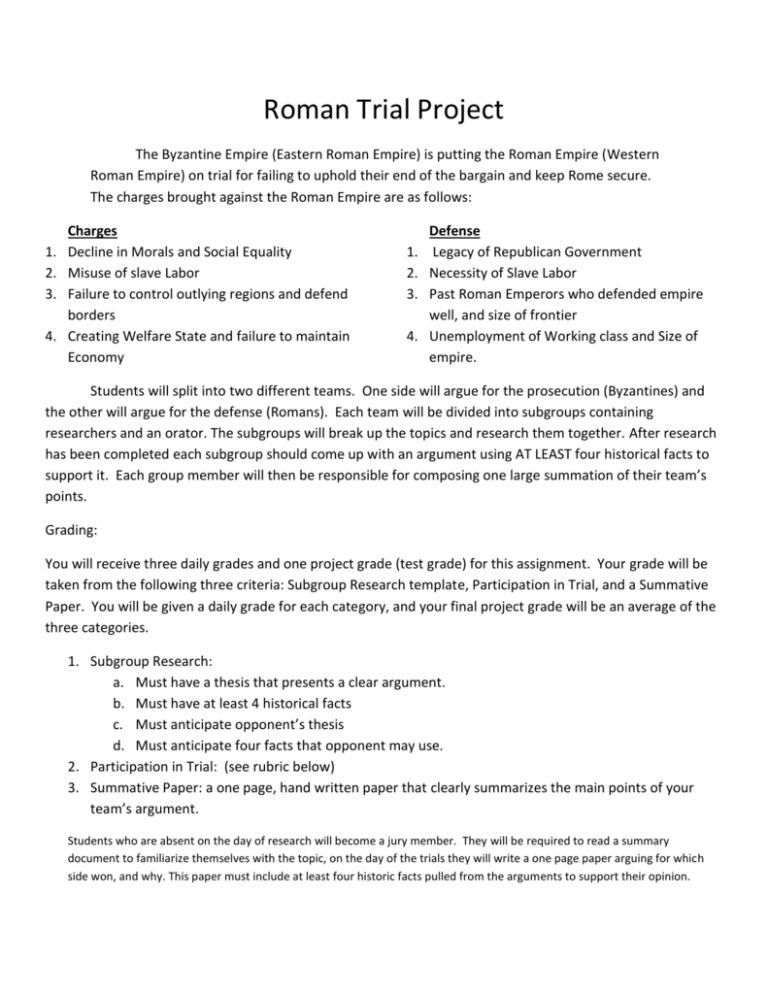
Roman Trial Project The Byzantine Empire (Eastern Roman Empire) is putting the Roman Empire (Western Roman Empire) on trial for failing to uphold their end of the bargain and keep Rome secure. The charges brought against the Roman Empire are as follows: 1. 2. 3. 4. Charges Decline in Morals and Social Equality Misuse of slave Labor Failure to control outlying regions and defend borders Creating Welfare State and failure to maintain Economy 1. 2. 3. 4. Defense Legacy of Republican Government Necessity of Slave Labor Past Roman Emperors who defended empire well, and size of frontier Unemployment of Working class and Size of empire. Students will split into two different teams. One side will argue for the prosecution (Byzantines) and the other will argue for the defense (Romans). Each team will be divided into subgroups containing researchers and an orator. The subgroups will break up the topics and research them together. After research has been completed each subgroup should come up with an argument using AT LEAST four historical facts to support it. Each group member will then be responsible for composing one large summation of their team’s points. Grading: You will receive three daily grades and one project grade (test grade) for this assignment. Your grade will be taken from the following three criteria: Subgroup Research template, Participation in Trial, and a Summative Paper. You will be given a daily grade for each category, and your final project grade will be an average of the three categories. 1. Subgroup Research: a. Must have a thesis that presents a clear argument. b. Must have at least 4 historical facts c. Must anticipate opponent’s thesis d. Must anticipate four facts that opponent may use. 2. Participation in Trial: (see rubric below) 3. Summative Paper: a one page, hand written paper that clearly summarizes the main points of your team’s argument. Students who are absent on the day of research will become a jury member. They will be required to read a summary document to familiarize themselves with the topic, on the day of the trials they will write a one page paper arguing for which side won, and why. This paper must include at least four historic facts pulled from the arguments to support their opinion. Instructions 1. Divide into two teams, Western Roman Empire or Byzantine Empire. a. Each team will prepare opening and closing statements b. Each team will also need to select an Orator to deliver the opening/closing statements 2. Each team will divide into subgroups, with one person from each subgroup designated as the orator. 3. Each Subgroup will have topics or charges that they are required to become experts on and prepare an argument for. a. The subgroups argument should include at least four historical facts to defend their arguments. b. The subgroup must anticipate an argument that their opponent will use, supported by four historic facts. 4. If a student is absent on the day teams are assigned, they will become a member of the jury. They will be required to read a summary document to familiarize themselves with the topic, on the day of the trials they will write a one page paper arguing for which side won, and why. This paper must include at least four historic facts pulled from the arguments to support their opinion. 5. On the day of the trial, students will present their argument in a debate style. a. The trial will begin with opening statements from each side (2 min each). b. The prosecution will then open with their first charge and the defense will counter with their first defense (3 min each). c. After the charges, each team will be given a 2 minute rebuttal. d. Repeat B and C until all charges have been argued. e. The trial will conclude with closing statements first from the prosecution, then the defense (2 min each). Charges: Members: Criteria 1 Organization 34 Points 33 Points Delivery 33 Points 3 4 Student presents Audience cannot Audience has Student presents information in understand difficulty following information in logical, interesting presentation because presentation logical sequence sequence which there is no sequence of because student which audience audience can information. jumps around. can follow. follow. 4 Points Content Knowledge 2 Points 14 Points 24 Points Students are Students do not have uncomfortable with Students are at grasp of information; information and are ease with content, student cannot answer able to answer only but fail to questions about rudimentary elaborate. subject questions. 23 Points 3 Points. 13 Points Students mumble, Students incorrectly incorrectly pronounces pronounces terms. Student's voice is terms, and speaks too Audience members clear. Student quietly for students in have difficulty pronounces most the back of class to hearing words correctly. hear. presentation. 23 Points 3 Points 13 Points 34 Points Students demonstrate full knowledge (more than required) with explanations and elaboration. ____ 33 Points Student used a clear voice and correct, precise pronunciation of terms. ____ 33 Points Total----> Comments: ____ ____



